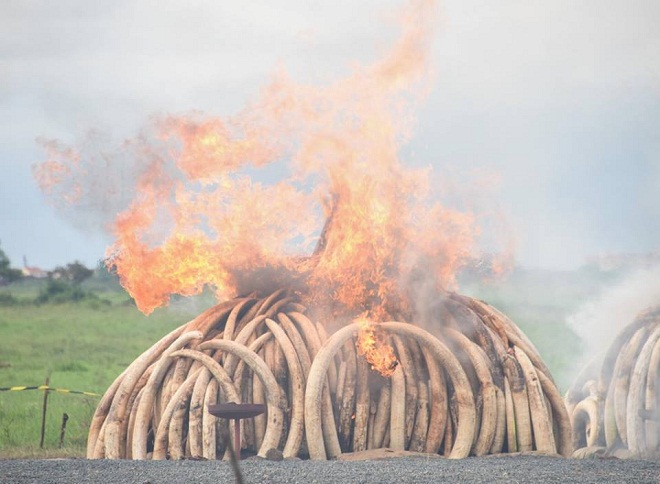
Why Africa should not celebrate the ban of ivory markets even if ending poaching is noble
COMMENT | GERALD MBANDA | China, which for decades has been the world’s largest ivory market, is hailed for her recent ban on ivory trade and shutting down more than 150 ivory factories and shops for ivory products. Unfortunately, but not surprisingly, African countries supported this anti-Africa conservation concept, claiming it will end poaching and protect elephants. China’s decision came as a result of persistent pressure from Western conservation groups and governments under the Convention on International Trade in Endangered Species (CITES) drafted in Washington DC in 1963. It should be noted that it is only in Africa and Asia where elephants are found in the world.
African countries possess the largest elephant population in the world; led by Botswana, South Africa, Namibia, and Zimbabwe. These countries have previously and rightly rejected burning ivory, and researchers confirm that there is no scientific evidence linking the burning ritual to reduction of elephant poaching. The countries mentioned have hundreds of tons of ivory worth millions of dollars that would support their economies. But they are not allowed under the CITES convention to sell them. Interestingly, the same convention has never outlawed trophy hunting; usually enjoyed by western tourists in Africa, and in this way, no endangered species are seen to be killed.
Under the CITES convention, African countries have since 1989, been ill-advised to burn all ivory confiscated from poachers as a means of protecting the elephants. Kenya has since 1989 taken the advice seriously, and in 2016 alone, 105 tons of ivory valued at $15million, the largest single ivory burn globally, was put to flames at a time when a number of wild life conservation projects were underfunded. Ironically Kenya begged Western countries for financial support.
Foreign imposed polices like CITES contradict logic in all ways. For example, if I catch a thief stealing food from my store, and I conclude that destroying the food is the best way to keep thieves away, then something is wrong. I would instead be risking starvation. The same applies to poachers and burning ivory as a deterrent. Kenya has been burning ivory since 1989, but poaching has not ceased, and now the reasoning by CITES is; “ivory must be worth nothing”!
Ivory use is traced for the last 35,000 years; since man discovered that ivory is an important commodity that has value attached because of its unique qualities. Therefore rendering it value less in the 21st century raises more questions than answers.
If one may ask; why is Africa still subjected to pre-colonial and neo-colonial treaties like CITES which do not serve Africa’s interests? The countries that have elephants should have better knowledge on how to protect their species, rather being subjected to treaties that serve foreign interests. It is possible for Africa to take control and make commercial value and use of ivory, referred to as “white gold”, through legal markets while at the same time maintain measures to protect the elephants. Africa needs ivory dollars to improve conservation, build health centres, schools, and ultimately end poverty.
In the first place, African elephants were rendered endangered species mainly due of Western insatiable affinity for African resources. The trans-Atlantic- slave trade that lasted for 450 years, is estimated to have taken more than 4.5 million African slaves to Europe and America along with hundreds of tons of ivory, leaving millions of elephants dead. The West benefitted millions of dollars from ivory trade but today, the rule of the game has changed, that Africa should not sell ivory because elephants will die, and we agree!
Both burning and banning of ivory markets to end elephants poaching makes no economic sense; it is like a doctor treating symptoms and not the root causes of a disease. In his analytical book: `How Europe Under Developed Africa’; Walter Rodney observes that, “The phenomenon of neo-colonialism cries out for extensive investigation in order to formulate the strategy and tactics of African emancipation and development”. The African Union reform process needs to investigate and take measures on Rodney’s counsel and wisdom.
The CITES policy of killing ivory markets resonates with the 1980s World Bank and IMF advice on structural adjustment programs in Africa. Countries were plunged into a debt cycle where they needed more loans to pay debts and were unable to use the loans for development. The Zambian government for example, is said to have spent 35 times more money on debt repayment than on both primary and secondary education, between 1990 and 1993. Nigeria, which borrowed $5billion in 1978, had by 2000 had paid back $16billion (more than 3 times of the borrowed money), but still owed $31 billion! Similarly, the killing of world ivory markets apparently prevents Africa’s self-reliance, and promotes foreign interests and aid dependence.
The slogan by foreign conservation groups that, “ivory is worthless unless on a live elephant”, implies that elephants are only good for Western tourists to come and see. This is wrong. It is possible to earn both tourism and ivory sale income and at the same time eliminate poaching.
Tangible conservation measures like embracing modern conservation methods supported by new technologies like drones to fight poachers have given impressive results in some countries.
Poverty by people around the game parks may tempt them to kill the animals and therefore, effective community based conservation approaches that educate and economically empower, local communities by benefiting on tourism revenues, turn both real and potential poachers into partners in protecting the animals. Measures to fight corruption among game rangers and tough laws to prosecute poachers and fight corruption are among pragmatic ways to end the vice. Governments should further take action to eliminate land conflict between animals and humans, like installation of electric fences and digging of wide trenches along game parks.
The killing of elephants for ivory is bad and should be fought. However, harvested ivory through culling, elephants that die of old age, diseases and accidents, must be a tradable commodity and source of revenue for African countries with elephants. Legal Ivory markets and industries to process ivory products are, therefore, necessary. Africa should be bound by international treaties that benefit the African people, and I believe it is not too late to advocate for the reversal of CITES action and re-open legal ivory markets.
*****
Gerald Mbanda is a journalist and Pan Africanists based in Kigali-Rwanda
Twitter: @GeraldMbanda
 The Independent Uganda: You get the Truth we Pay the Price
The Independent Uganda: You get the Truth we Pay the Price


